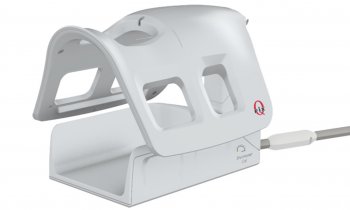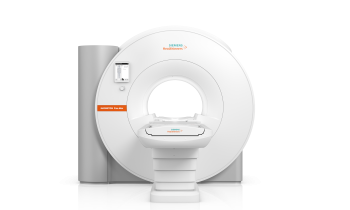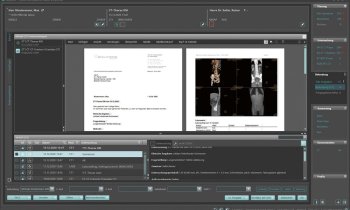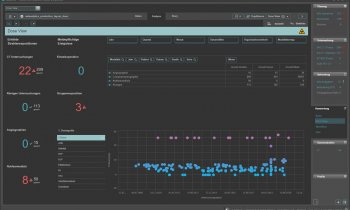© Anatomy Insider – stock.adobe.com
News • New organ-preserving options explored
Five major advances in anal and rectal cancer treatment with radiotherapy
Rectal cancer is a type of bowel cancer that develops in the last several centimetres of the large intestine, just before the anus. It’s one of the most common cancers in Europe, with over 125,000 people diagnosed annually.
Treatment traditionally involves surgery to remove the tumour—a major operation that can permanently affect sexual function, continence, and quality of life. While radiotherapy and chemotherapy are already used to shrink tumours before surgery, there is growing momentum behind treatment strategies that avoid surgery in patients, where the tumour has disappeared after radiotherapy and chemotherapy. Such so-call “organ preservation strategies” aim to preserve the rectum, and thereby maintain a better quality of life for cancer patients—especially for early-stage and locally advanced cases.
In contrast, anal cancer affects the lowest few centimetres of the bowel. It is a rare disease and is diagnosed in around 14,000 people in Europe annually. Anal cancer is more sensitive to radiotherapy, and previous clinical trials have shown that a combination of radiotherapy and chemotherapy can replace the need for major surgery and a permanent colostomy. However, the current standard approach results in high rates of short and long-term side effects.
Now, five pivotal studies presented at ESTRO 2025, the annual congress of the European Society for Radiotherapy and Oncology, showcase how radiotherapy is reshaping this landscape. From reduced-dose treatments to cutting-edge combinations with immunotherapy and chemotherapy, these innovations offer safer, more effective, and organ-preserving alternatives to traditional surgery.
ACT4 PLATO: Shorter, lower-dose radiotherapy as a highly effective treatment for early-stage anal cancer
The ACT4 PLATO trial1, led by Professor David Sebag-Montefiore from the University of Leeds and Leeds Teaching Hospitals NHS Trust, has demonstrated that a reduced-dose, shorter-course highly focused radiotherapy technique (IMRT) offers excellent tumour control with fewer side effects for early-stage anal cancer. The randomised phase II trial, conducted across 28 UK sites, showed similar efficacy and late toxicity levels using a reduced-dose IMRT regimen over 4.5 weeks and standard-dose IMRT over 5.5 weeks. “Our results support moving toward shorter, more personalised radiotherapy,” said Professor Sebag-Montefiore. “This approach reduces the treatment burden for both patients and healthcare systems.”
STAR-TREC: Radiotherapy alone and radiotherapy combined with chemotherapy both enable patients to avoid surgery for rectal cancer
The STAR-TREC study2 has shown that organ-preserving strategies are feasible for patients treated with radiotherapy alone as well as for patients treated with radiotherapy and chemotherapy. Among 344 patients at 37 international sites, 80% of those treated with chemoradiotherapy and 61% of those treated with radiotherapy alone could be spared surgery at one year. “Avoiding surgery helps preserve bowel function and quality of life,” said Prof Dr Corrie Marijnen, of the Netherlands Cancer Institute. “This study shows that radiotherapy-based strategies (whether alone with more intensive treatment course, or combined with chemotherapy) can be a viable alternative for many patients.”
PRIME-RT: Immunotherapy-radiotherapy combo eliminates cancer in two-third of patients in UK trial
PRIME-RT, a trial conducted across the UK3, found that 67% of evaluable patients receiving a short-course of radiotherapy, meaning only five outpatient sessions (no overnight stay) of radiotherapy, combined with immunotherapy had a complete response, meaning no signs of cancer remained. “By combining immunotherapy with radiotherapy, we are seeing higher response rates than expected, especially with short-course radiotherapy," said Professor Campbell Roxburgh, from the University of Glasgow, UK.
STELLAR II: Combining radiotherapy with immunotherapy and chemotherapy for better organ preservation
Similarly, in the STELLAR II trial from China4, immunotherapy added to short-course radiotherapy and chemotherapy increased complete disappearance of the tumour to 45.5%, compared to 25% with standard treatment. “By combining immunotherapy with short-course radiotherapy and chemotherapy, we may be able to improve survival rates and, crucially, help more patients avoid invasive surgery and its long-term effects,” said Professor Jing Jin, from the National Cancer Centre, China.
By leveraging advanced radiotherapy strategies, we are not only improving survival rates but also prioritising quality of life for patients worldwide
Matthias Guckenberger
The phase III STELLAR trial5 tracked 591 patients in China with locally advanced rectal cancer over five years. It found that short-course radiotherapy followed by chemotherapy improved survival by 8.4% compared to standard long-course chemoradiotherapy—with no negative impact on anorectal function or quality of life. "This could be a game-changer for patients, offering a faster, equally safe, and potentially more effective option," said Prof. Jin.
Together, these five studies demonstrate the transformative potential of radiotherapy as a curative and organ-preserving treatment. As new data emerges, personalised radiotherapy strategies are offering patients safer, effective alternatives to surgery. “These breakthroughs represent a major step forward,” said ESTRO President elect Professor Matthias Guckenberger. “By leveraging advanced radiotherapy strategies, we are not only improving survival rates but also prioritising quality of life for patients worldwide.”
With these findings set to influence global clinical guidelines, the future of rectal cancer treatment is moving decisively toward combined radiotherapy-driven, organ-preserving solutions.
References:
- Abstract n° E25-3665: “PLATO ACT 4: Long term results of an RCT evaluating reduced dose and standard dose chemoradiotherapy in early-stage anal cancer”, presented in the Joint Green Journal - The Lancet Oncology: Top Clinical Trials session, on Sunday 4 May at 11:40 hrs (CEST), Plenary Hall.
- Abstract n° E25-1489: “STAR-TREC (NCT02945566): A randomised phase II/III trial of CRT versus 5x5 Gy SCRT for organ preservation in early/intermediate risk rectal cancer”, presented in the Joint Green Journal - The Lancet Oncology: Top Clinical Trials session, on Sunday 4 May at 11:49 hrs (CEST), Plenary Hall.
- Abstract n° E25-1116: “PRIME-RT: Durvalumab (MEDI 4736) with extended neoadjuvant regimens in locally advanced rectal cancer: a randomised phase II trial”, presented in the Joint Green Journal - The Lancet Oncology: Top Clinical Trials session, on Sunday 4 May at 12.06 hrs (CEST), Plenary Hall.
- Abstract no E25-837: “Preoperative Short-course Radiotherapy Followed by Chemotherapy and PD-1 Inhibitor for Locally Advanced Rectal Cancer: Phase II Results of STELLAR II”, presented in the Joint Green Journal - The Lancet Oncology: Top Clinical Trials session, on Sunday 4 May at 12.24 hrs (CEST), Plenary Hall.
- Abstract no E25-2250: “Short-term radiotherapy plus chemotherapy for locally advanced rectal cancer: 5-year outcomes of the phase III clinical trial”, presented in the Joint Green Journal - The Lancet Oncology: Top Clinical Trials session, on Sunday 4 May at 12.15 hrs (CEST), Plenary Hall.
Source: European Society for Radiotherapy and Oncology
04.05.2025











